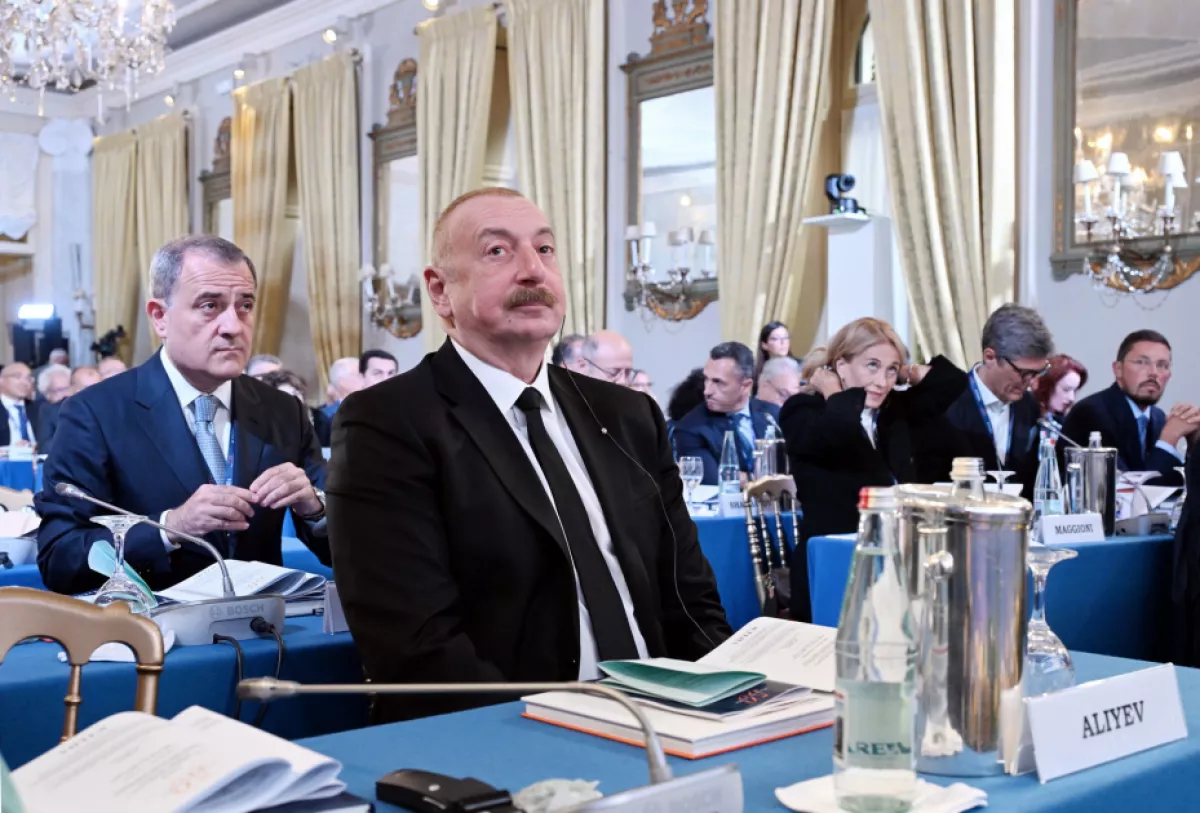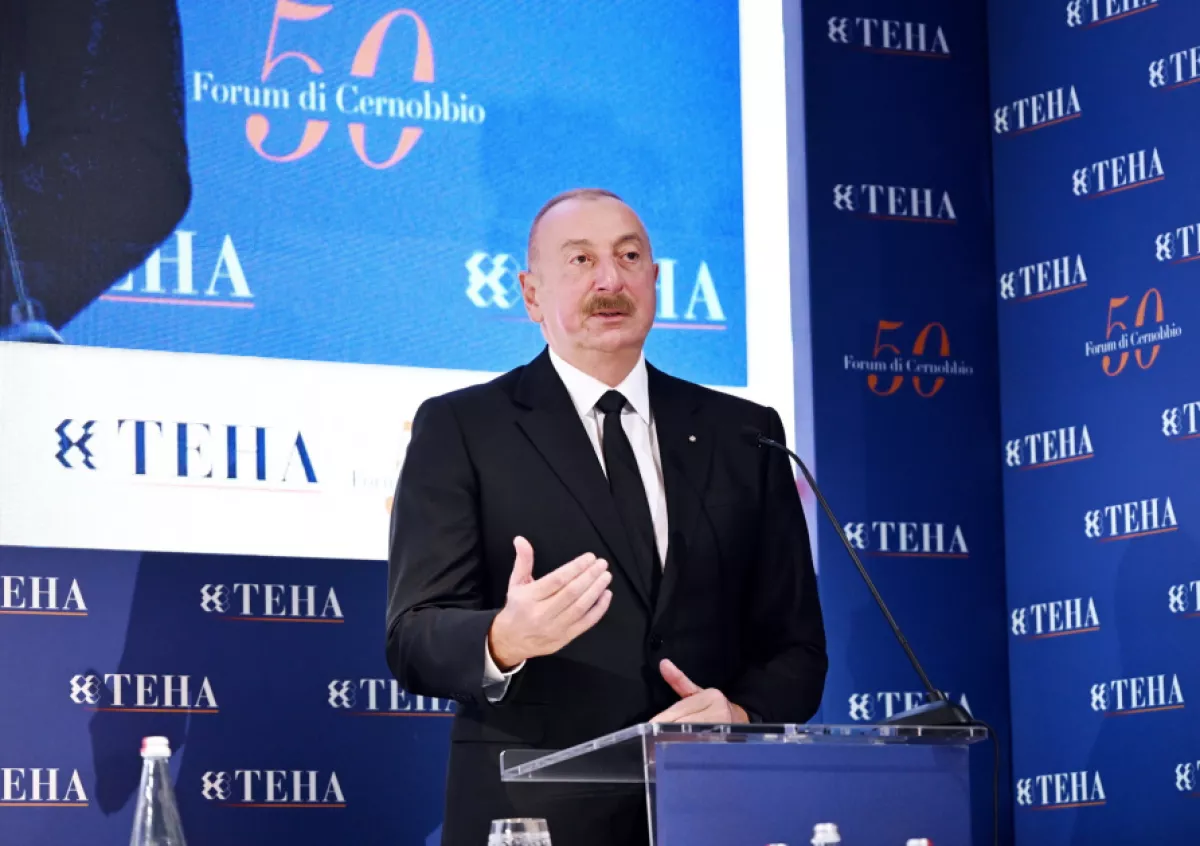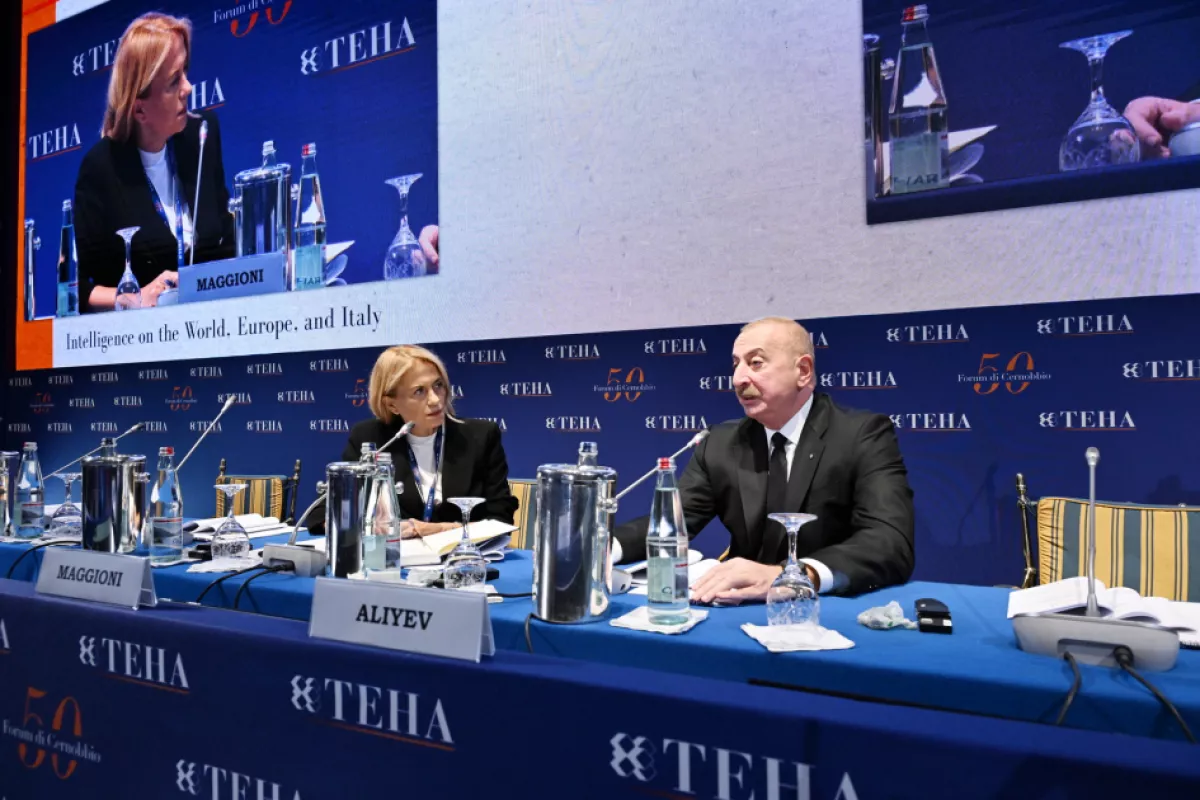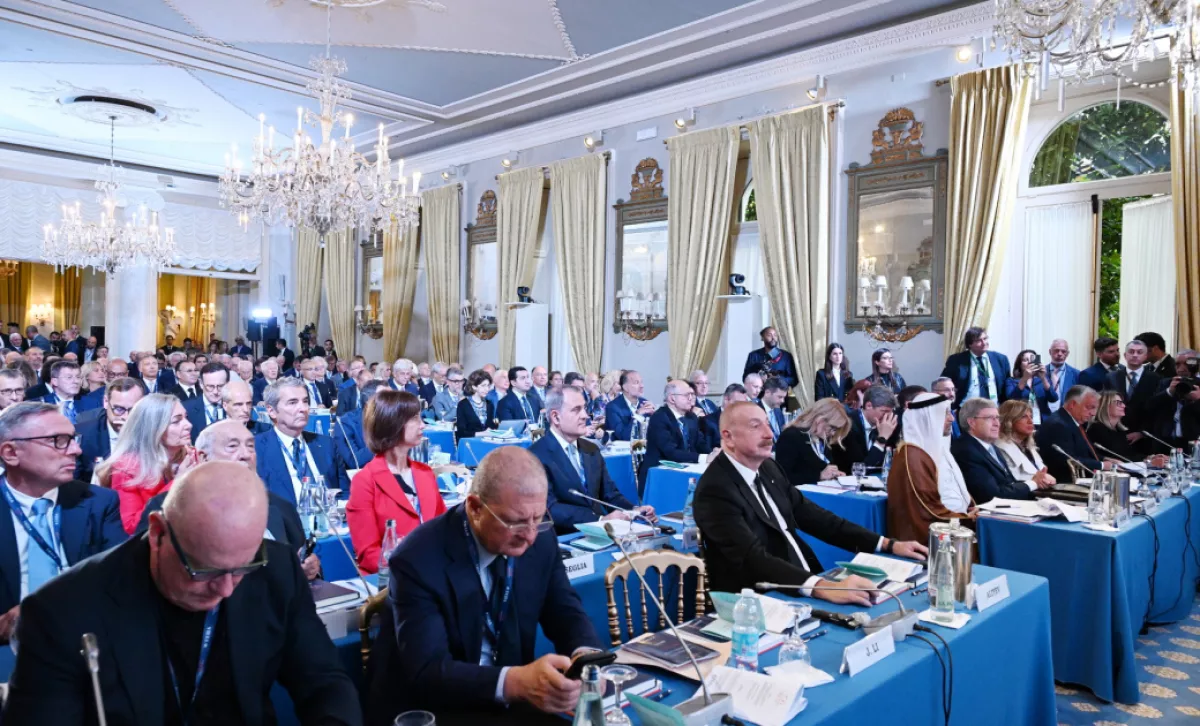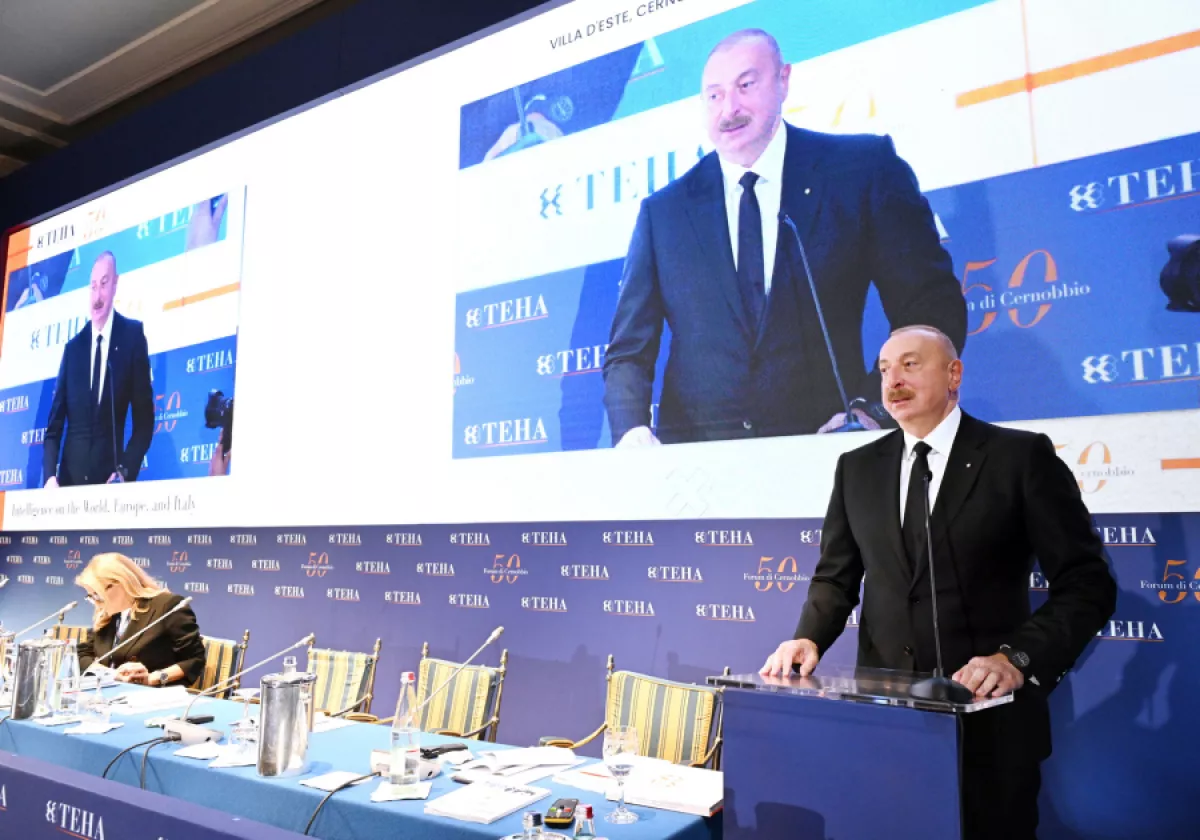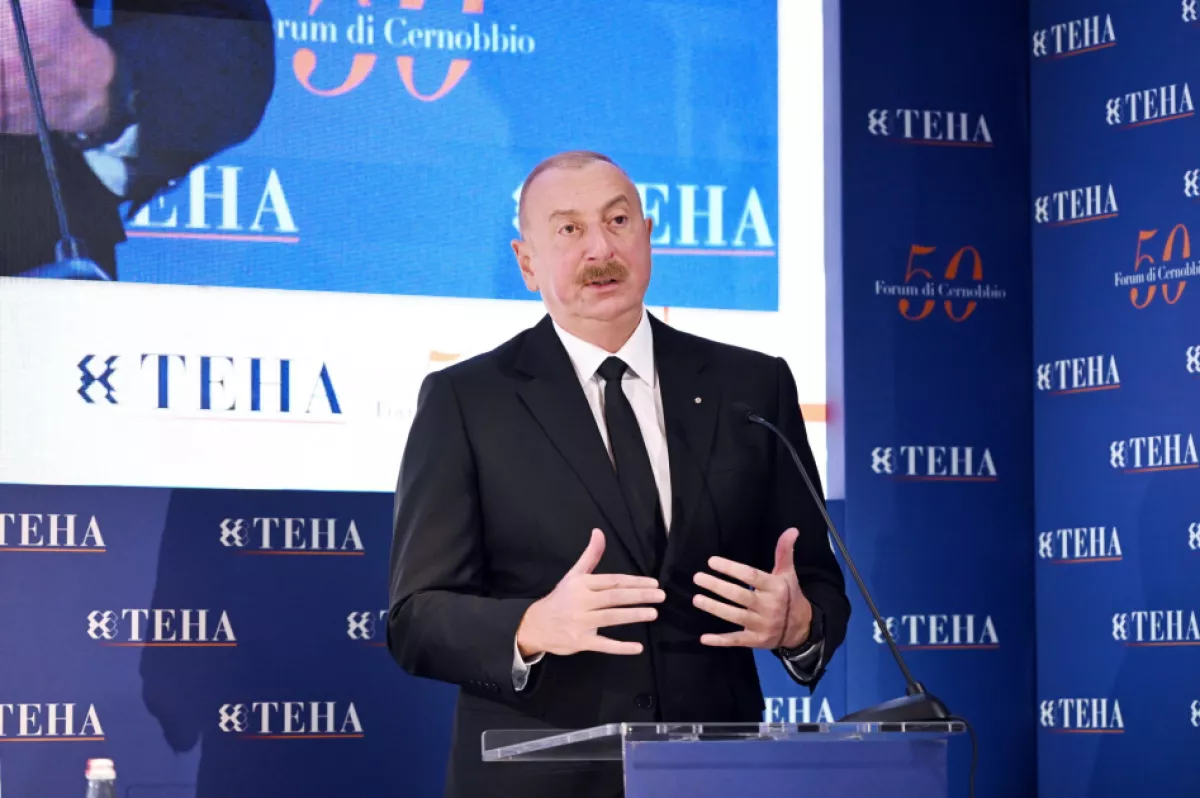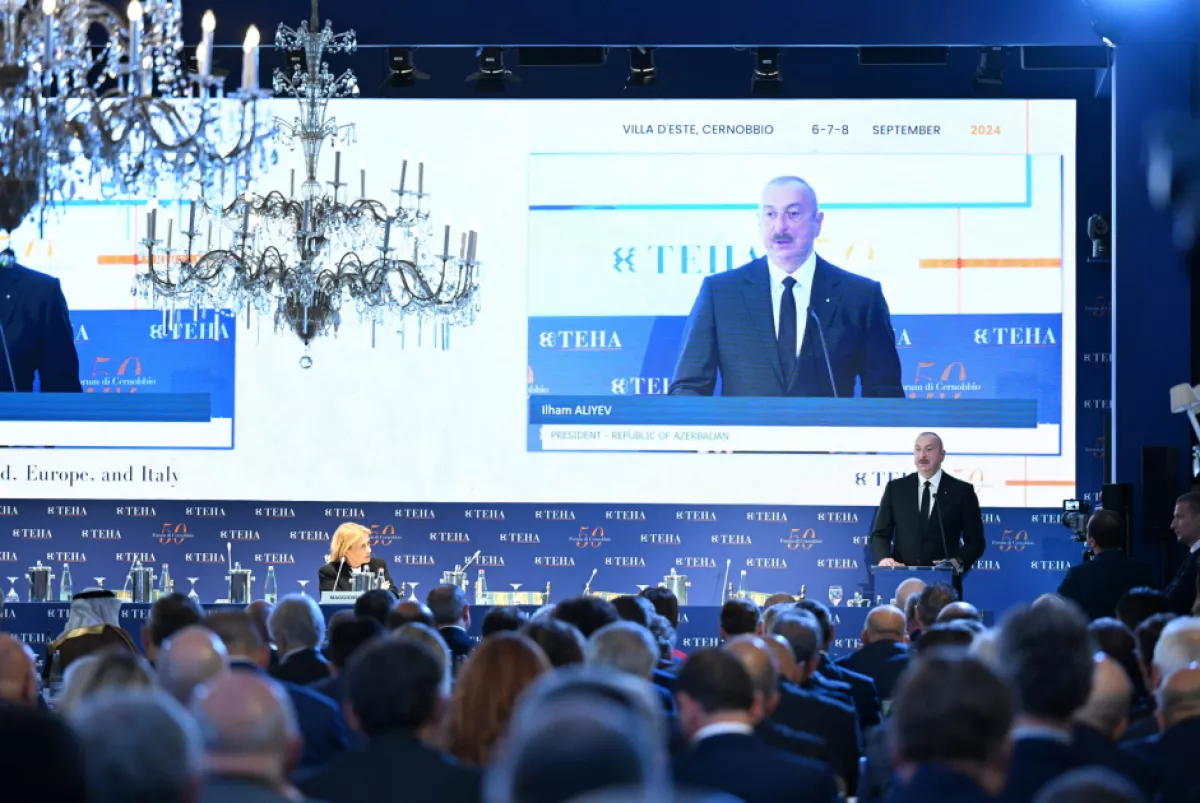Azerbaijani president addresses international forum in Cernobbio, Italy VIDEO / UPDATED
On September 6, President of Azerbaijan Ilham Aliyev delivered a speech at the session titled “Azerbaijan's role in the new geopolitical environment” at the International Cernobbio Forum themed “Intelligence on the World, Europe, and Italy.”
The moderator, greeting the event participants, said:
- I welcome everyone to this prestigious forum. In his speech, President Mattarella highlighted the role of Europe and its significance in the global context. With your permission, let me give the floor to our esteemed first speaker. His Excellency Mr. Ilham Aliyev, President of the Republic of Azerbaijan, will address his country's position in relation to this scenario. Your Excellency, the floor is yours.
The head of state addressed the session.
Caliber.Az presents the full speech by President Ilham Aliyev.
- Distinguished ladies and gentlemen.
First, I would like to express my gratitude to the organizers for the invitation. This is the second time I am participating in the Cernobbio Forum. I have very good memories of my being here two years ago. Once again, thank you for inviting me.
I came here from Rome, where yesterday I had meetings with President Mattarella, who made a great speech this morning, and Prime Minister Meloni. During our meetings and discussions, we once again reconfirmed the strategic character of our bilateral ties. Italy and Azerbaijan have worked as strategic partners for many years. The corresponding declaration was adopted almost ten years ago. Our cooperation covers many areas. We have regular political contacts. This is my third visit to Italy since 2020, and President Mattarella paid a visit to Azerbaijan in 2018. High-level contacts demonstrate that we are very close partners.
We have very active trade cooperation. Italy is Azerbaijan’s number one trading partner in the world. Last year, our trade turnover was close to 16 billion US dollars. We see potential for growth not only in the energy sector but also in other sectors. Azerbaijan is the Italy’s number one oil supplier and number two gas supplier. This is also an important part of our cooperation.
Energy supplies today clearly demonstrate that national security cannot be separated from energy security. The 3,500 km integrated pipeline system from Azerbaijan to Italy, known as the Southern Gas Corridor, today ensures energy security for ten countries. We now have ten countries receiving gas from Azerbaijan, seven of which are members of the European Union. That is probably why the European Commission calls Azerbaijan a pan-European gas supplier and a reliable partner.
But as I said, the pipeline starts in Azerbaijan and ends in Italy. But its route, with extensions and interconnectors, covers a broad European and Eurasian geography with strong growth potential. Today we are in a process of negotiations with at least three European countries with respect to gas supply.
Of course, energy and trade are not the only part of our bilateral agenda. We are also actively working on humanitarian issues. The Italy-Azerbaijan University, which has already started functioning, is a great example of the diversification of our cooperation. Five leading Italian universities like Luiss, Sapienza, Bologna, Milan, and Torino, and Azerbaijan’s ADA University, have created this joint venture, which will be instrumental in our future cooperation. The students who are already studying and those who will study there will naturally be connected to Italy. They will know the Italian language, Italian culture and the great historical heritage of the Italian people.
I start my introduction with this important bilateral part because it demonstrates that when relations are built on mutual trust, mutual respect, and recognition of mutual interests, then we see a progress. That is how relations must be built between countries, which are situated far from each other and belong to different continents.
Talking about the geopolitical situation - because the topic of my introduction was exactly the role of Azerbaijan in the changing geopolitical environment – first of all, I would like to say that the biggest geopolitical change, not only in the Caucasus but in the broader region, was the restoration of Azerbaijan’s territorial integrity and sovereignty, which really demonstrates that international law can prevail, not only when a legal framework exists but also when you have courage and real strength.
For 30 years, our internationally recognized territories were under Armenian occupation. Despite numerous decisions and resolutions by international organizations, including four legally binding United Nations Security Council resolutions demanding the immediate withdrawal of Armenian forces from our lands, the occupation continued. The OSCE created a special group in order to tackle this issue. For 28 years, this group produced zero results. This demonstrates that international law alone is not enough to ensure justice and peace. So you must have other factors on the table.
In 2020, a large part of our then-occupied territories was liberated during the 44-day Patriotic War. But that was not the end of the story, as separatists continued to undermine sovereignty of Azerbaijan. Last September, it was the last full stop when sovereignty of Azerbaijan was totally restored. The conflict actually ended as it should have.
This is a good example for many other countries, which struggle for their territorial integrity and sovereignty without success. In our case, I think Azerbaijan demonstrated that international law, along with strong political will, consolidation of the society, and physical strength, can make a serious geopolitical change. After that, for the first time since the collapse of the Soviet Union, we can achieve peace in the Southern Caucasus. It is reachable. The latest developments in the negotiation track between Azerbaijan and Armenia demonstrate that. We are actively continuing negotiations, with almost 80 percent of the peace treaty paragraphs having been approved. We have already started not only the border delimitation process, but also demarcation. Yes, it’s a first small step. Only about 13 kilometers of our border, which is more than 1000 kilometers. But it is a step in the right direction.
We hope that Azerbaijan’s initiative to start peace negotiations will result in a peace treaty that will be important not only for the Southern Caucasus but for all parts of the world. That will be an example of how countries that have fought for 30 years, with Azerbaijan suffering from aggression and the total devastation of almost 20 percent of its territory, can work together to achieve peace.
The final point which I want to raise in my introductory comments is that, in two months, we will host the largest climatic conference, COP29. The decision was made last December. We have had less than one year to prepare. It is important that the decision was made by consensus of almost 200 countries. We consider it as a sign of respect for Azerbaijan. For the first time in history, COP will be held in our region.
We are actively working in order to build bridges between different actors on the global arena. As we all know, the climatic topic is something, which divides countries and peoples. There are mutual claims and accusations about who is more responsible for damaging the planet and who has to pay more ant etc. While not being a major actor on international arena, I think it is achievable for us to build bridges between the Global South and the Global North.
I also want to underline that through active cooperation with many European countries, including ten members of the European Union, which are Azerbaijan’s official strategic partners and as the Chair of the Non-Alignment Movement for four years, which unites 120 countries, we can be a country, which can produce good results.
These are the topics I wanted to address during my introduction. Once again, thank you for giving me the opportunity to address this audience.
Moderator: Just a couple of questions. You talked about creating bridges. How do you see your country in the context of the discussion about how to come out of the conflict between Russia and Ukraine? Do you see any role, any proposal? Because there are some platforms and proposals.
President Ilham Aliyev: For a hypothetical possibility, it is possible. First of all, taking into account that, together with Russia and Ukraine, we were part of the Soviet Union for 70 years, we have diversified connections on a people-to-people level and on a political level. Today, we consider our relations with Russia and Ukraine to be very good. We strongly support Ukraine’s and all countries’ territorial integrity and sovereignty.
But at the same time, we were not, and we will not be a part of the anti-Russian sanctions, campaign. With these pragmatic relations, I think we can play a role. We have never initiated that. I know that there are many others who want to be around. But if our involvement is needed, we are ready.
What I can say now to the audience that we have been approached by Russia, Ukraine and European institutions in order to facilitate with the continuation of the gas transit through Ukraine. Already for several months, we have put a lot of efforts in order to find a common ground for that because we know that if this transit stops, and that is planned for December, several countries of the European Union will face serious difficulties with the physical access to natural gas. So, we just want to support those countries and also Ukraine because if the transit stops, the Ukrainian gas distribution system will be absolutely paralyzed.
So, we have certain optimism because in recent context with both countries we think there is ground for a breakthrough. Probably, it may be premature for me to go into too much detail, but if it works, then we may be able to do other things in order to help put an end to this war, which is destroying the whole region.
Moderator: So, you see some opportunity here?
President Ilham Aliyev: Yes, I see, because now, actually through Azerbaijan, both countries are negotiating the continuation of Russian gas transit and Azerbaijani gas supply through Russia and Ukraine to Europe.
Moderator: President Aliyev, thank you for being with us. Can you say something else? Because I have seen the news these days there has been a decision by your country to declare persona non grata several members of the Parliamentary Assembly of the Council of Europe. Among them are five Italian MPs. This is not that much in tune with what you told us about building bridges, importance of being diplomatic and reaching out. So how come?
President Ilham Aliyev: Thank you for this question. There is a certain misunderstanding with respect to this issue. But in order to give you a comprehensive response, I need to go back, maybe more than twenty years, to when Azerbaijan was adopted to the Council of Europe in 2001. At that time, I was a member of the Parliament of Azerbaijan and the first head of the Azerbaijani delegation to the Parliamentary Assembly of the Council of Europe. We have been there since 2001, and throughout these years, we had ups and downs. We had active phase of cooperation, faced a lot of criticism from the Parliamentary Assembly, joined most of the European conventions, and implemented decisions of the European Court of Human Right and etc.
But, what happened this January was crossing the red line. Why did it happen? As I already said in my introductory comments, we restored our sovereignty completely last year. So last September, separatism was totally eliminated from Azerbaijan’s soil. We did not do anything different from what Ukraine is trying to do. Ukraine is trying to restore its sovereignty without success, regardless of huge Western support. We restored our sovereignty without any support, by ourselves.
Just in several months after that, the Parliamentary Assembly of the Council of Europe decided to deprive our delegation from its voting right. These were the sanctions imposed on us because we restored our sovereignty. We fought on our land, we did not launch aggression.
Those who voted for this don’t want to see us in the Council of Europe. So, the decision of Azerbaijan was adequate. So our decision was a response. If they change their decision and restore our right, in January they will have this chance, so this so-called embargo will be lifted. I regret that members of the Italian Parliament voted for that. Frankly speaking, I do not know the names of the people who are on this list of 70+, but there is a chance to improve the situation. Our delegation should be back, and then the ban will be lifted.
Moderator: Thank you for the answer. Nevertheless, building bridges is better than responding to each other. But again thank you for being with us, President Aliyev.
11:41
As part of his working visit to Italy, Azerbaijani President Ilham Aliyev has attended the International Forum "Intelligence on the World, Europe, and Italy" in Cernobbio, organized by the think tank The European House – Ambrosetti.
President Aliyev addressed the discussion platform about "Azerbaijan's role in the new geopolitical environment," Caliber.Az reports.
Among the key speakers at the forum, in addition to President of Azerbaijan Ilham Aliyev, are: Sergio Mattarella – President of the Italian Republic (via video link); Viktor Orbán – Prime Minister of Hungary; Giorgia Meloni – Prime Minister of Italy; Volodymyr Zelenskyy – President of Ukraine (via video link); Queen Rania of Jordan; and Josep Borrell – High Representative of the EU for Foreign Affairs and Security Policy.
Ilham Aliyev has previously participated in the Cernobbio Forum, notably as one of the key guests in 2022. In his speech, President Aliyev addressed key issues such as energy security, Azerbaijan's role in natural gas supplies to Europe, and the importance of investments in renewable energy sources. He also emphasized the significance of developing strategic relations with the European Union, particularly in the context of energy projects like the Southern Gas Corridor.
The European House – Ambrosetti has been a leading consulting and analytical company in Italy for over fifty years, providing high-level advice on management and strategic development. The organization plays a crucial role in international cooperation through its network of offices in Europe and beyond, as well as its active collaboration with leading global analytical centers. According to international rankings, The European House – Ambrosetti has repeatedly been recognized as a leading analytical center in Italy and has ranked among the top ten in the European Union.
One of the most significant events organized by this center is the International Forum "Intelligence on the World, Europe, and Italy," which is held annually at Villa d'Este on the shores of Lake Como. This forum brings together world leaders, government officials, economists, businesspeople, and experts, creating a unique platform for discussing global challenges and issues related to the economy, geopolitics, and scientific and technological advancements. The event is traditionally supported by the Italian government and includes video speeches from the country's president, highlighting the importance of this forum for both Italian and international political and business elites.
The forum lasts for three days, during which participants discuss key global economic and international political issues. The first day of the event is dedicated to discussing major world events and their impact on business and the economy, the second day focuses on Europe's role in the global context, and the third day is entirely devoted to issues concerning Italy, including participation from government representatives and major companies.




